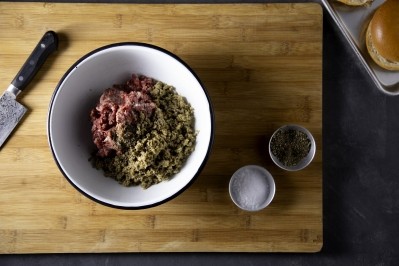Meet the start-up hooked on mycelium-based scallops: ‘We’ve left plants behind, and entered the fungi kingdom’

It is estimated that close to 80% of the world’s maritime fish stocks are either fully exploited, overexploited, or depleted. The UN expects this to have significant implications for food security and planetary health.
At the same time, demand for seafood is on the rise – expected to almost double by 2050 due to growing affluence and populations.
These two realities ‘don’t fit together’, according to entrepreneur Hendrik Kaye, who believes a global solution is required to overcome such a ‘huge’ problem. One such solution is swapping out conventional seafood in our diets for plant-based alternatives.
Yet Kaye believes plant-based alternatives have reached their technical limits, compromising on taste, texture, nutrition and sustainability: “When you think of the juicy, bouncy [texture] of say, smoked salmon, it’s obvious that’s impossible to replicate with pea or soy protein powders.”
Together with co-founder Bruno Scocozza, Kaye set up food tech start-up Esensia Foods to better mimic seafood, starting with scallops and salmon. Instead of basing the solution on plants, Esencia is ‘switching kingdoms’: “We leave the plants behind and enter the mycelium kingdom.”
Fungi-based scallops and smoked salmon
Mycelia is the root-like structure from which fungi grow. By leveraging a solid-state fermentation-based process, Esencia grows mycelium in a way that ‘mimics seafood’ and the ‘unique mouthfeel’ for which it is known, explained the co-founder: “The magic happens on the tray.”
The start-up’s end goal is to develop a technology platform capable of replicating many different varieties of fish and seafood. Targeting this category is important, Kaye stressed, suggesting alt seafood is often overlooked: “This segment of the market is much smaller, when you compare it to, say, burger alternatives.”
Esencia plans to first enter the market with mycelium-based alternatives to scallops and smoked salmon.
“Scallops are a great product, with a super high protein content, but we eat too few of them. Why is that?”
Kaye suspects it often comes down to a question of price. But willingness to pay for what is considered a premium product, with a premium price tag, is not the only reason, he told this publication. “Scallops work to clean our oceans. Mussels do too, but scallops in particular have a cleaning mechanism.”
Indeed, sea scallops are capable of ingesting pollution within our oceans, including microplastics which disperse throughout their body.
“When you consider how we currently treat our oceans, well, let’s just say there have been cases of scallops containing radioactive substances…
“Therefore, choosing not to consume too much of the original product can have huge health benefits for consumers. On the one hand, scallops can continue to do their job, and at the same time, consumers won’t mess with their health by eating too many real scallops.”

As to why Esencia is choosing to mimic smoked salmon, Kaye explained it is one of the most consumed products: “It has a big market.” In the EU, the market volume is expected to reach 232,000 kilotons by the end of 2025.
In terms of properties, smoked salmon is also an attractive product because it can be consumed cold – which makes it easier to replicate, the co-founder explained.
At the same time, the product comes with some ‘interesting’ challenges, too. Smoked salmon is naturally fatty, for example, which is essential to recreating its ‘very particular’ texture. The start-up plans to collaborate with a plant-based fat company on its smoked salmon alternative, as well as for other products in its pipeline. “Market size and R&D align very well here,” we were told.
Commercialisation plans
Texture aside, Esencia is convinced it can also hit the mark on protein content. Mycelia can be ‘tweaked’ to increase its protein content, explained Kaye.
“Of course, every tweak can have certain downsides, such longer growth time, for example. But in the end, the magic lies in finding the right compromise between what is economically feasible and nutritionally similar to conventional seafood, which is important.”
The second most significant ingredient within the product is omega 3, which can be incorporated into the final product via algae. “That’s the beauty of mycelium: you can mix the substrate so that in the end, the fungus basically soaks up part of it and produces mycelium with omega 3 included.”

Depending on whether Esencia’s product falls under Novel Foods regulation in Europe – which would mean it requires pre-market approval – its first product could reach the market as soon as late 2023 or early 2024.
Europe is Esencia’s target market, and it hopes to first launch into restaurants and foodservice, before expanding into retail. The company is also open to exploring B2B partnerships down the line.































